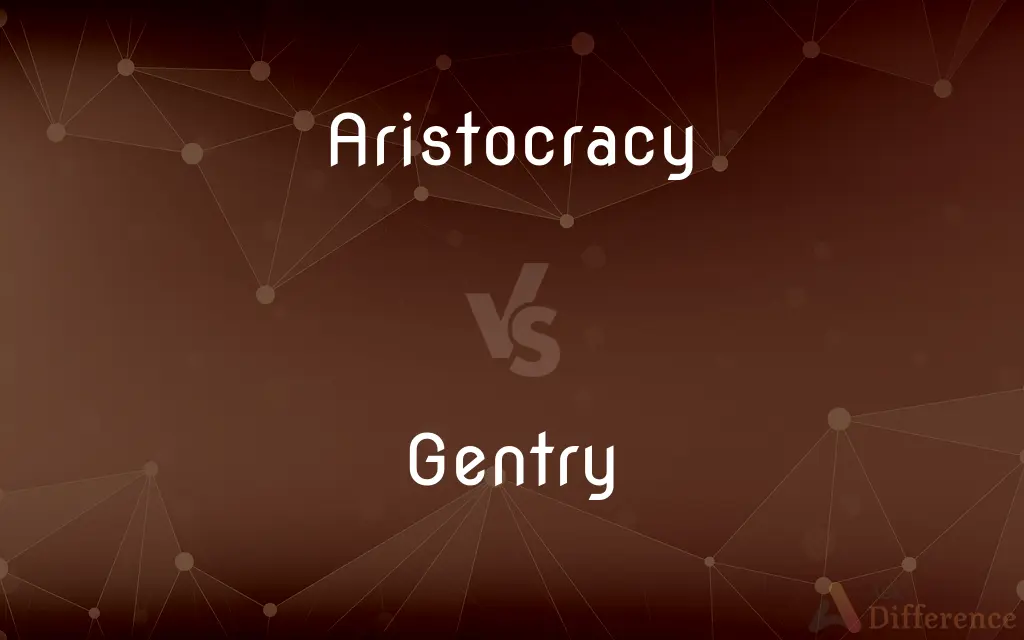Aristocracy vs. Gentry — What's the Difference?
By Maham Liaqat & Fiza Rafique — Updated on April 6, 2024
Aristocracy refers to the highest class in certain societies, often hereditary nobility, while gentry typically denotes well-born, genteel, and often land-owning people below the nobility.

Difference Between Aristocracy and Gentry
Table of Contents
ADVERTISEMENT
Key Differences
Aristocracy is characterized by its hereditary titles, privileges, and roles in governance, traditionally holding significant power and influence over political and social systems. The gentry, although not holding titles of nobility, possess social status and wealth, often derived from land ownership and are integral to the local leadership and community.
While aristocrats often have a national or even international influence, participating in the highest circles of power and decision-making, the gentry's influence is usually more localized, involved in rural administration and local politics. Aristocrats are often involved in the upper echelons of government, diplomacy, and in some cases, the military, reflecting their status and responsibilities. On the other hand, members of the gentry, while they may also serve in government or the military, typically do so at a lower or regional level.
The distinction between aristocracy and gentry can also be seen in their respective lifestyles and expectations. Aristocrats traditionally have access to vast resources, including large estates, and have a lifestyle that emphasizes their elite status. The gentry, while comfortable and influential, typically lead a lifestyle that, while refined, is less opulent compared to that of the aristocracy.
Despite these differences, both groups have played crucial roles in the history and development of societal structures, influencing culture, politics, and the economy through their leadership, patronage, and stewardship of the land.
Comparison Chart
Social Rank
Highest class, often hereditary nobility
Well-born and genteel, below nobility
ADVERTISEMENT
Source of Wealth
Land, hereditary wealth, and privileges
Primarily land ownership
Influence & Power
National/international, significant roles in governance
Localized, involved in rural administration
Lifestyle
Opulent, large estates and resources
Comfortable and refined, less opulent
Role in Society
Governance, diplomacy, military leadership
Local politics, community leadership
Compare with Definitions
Aristocracy
Land and Wealth.
Members of the aristocracy often own extensive lands and estates, showcasing their wealth and status.
Gentry
Social Status.
Despite not being nobles, the gentry are highly respected for their genteel manners and lineage.
Aristocracy
Hereditary Nobility.
The aristocracy has historically played a pivotal role in governance through hereditary titles and privileges.
Gentry
Land Ownership.
The gentry often played a key role in local communities through their land ownership.
Aristocracy
Military Leadership.
Historically, aristocrats frequently held high-ranking positions in the military.
Gentry
Community Leadership.
Members of the gentry often held positions of leadership in local governments.
Aristocracy
Political Influence.
The aristocrat used his influence in the senate to shape national policy.
Gentry
Refined Lifestyle.
The gentry, known for their refined tastes, contributed significantly to local arts and culture.
Aristocracy
Opulent Lifestyle.
The aristocracy is known for their lavish parties and grand estates.
Gentry
Local Influence.
He used his status within the gentry to improve local infrastructure and education.
Aristocracy
Aristocracy (Greek: ἀριστοκρατία aristokratía, from ἄριστος aristos 'excellent', and κράτος, kratos 'rule') is a form of government that places strength in the hands of a small, privileged ruling class, the aristocrats. The term derives from the Greek aristokratia, meaning 'rule of the best'.At the time of the word's origins in ancient Greece, the Greeks conceived it as rule by the best-qualified citizens—and often contrasted it favorably with monarchy, rule by an individual.
Gentry
People of gentle birth, good breeding, or high social position.
Aristocracy
The highest class in certain societies, typically comprising people of noble birth holding hereditary titles and offices
Members of the aristocracy
Gentry
An upper or ruling class.
Aristocracy
A hereditary ruling class; nobility.
Gentry
The class of English landowners ranking just below the nobility.
Aristocracy
Government by a ruling class.
Gentry
People of a particular class or group
Another commuter from the suburban gentry.
Aristocracy
A state or country having this form of government.
Gentry
Birth; condition; rank by birth.
Aristocracy
Government by the citizens deemed to be best qualified to lead.
Gentry
Courtesy; civility; complaisance.
Aristocracy
A state having such a government.
Gentry
People of education and good breeding.
Aristocracy
A group or class considered superior to others.
Gentry
(British) In a restricted sense, those people between the nobility and the yeomanry.
Aristocracy
The nobility, or the hereditary ruling class.
Gentry
Birth; condition; rank by birth.
She conquers him by high almighty Jove,By knighthood, gentry, and sweet friendship's oath.
Aristocracy
Government by such a class, or a state with such a government
Gentry
People of education and good breeding; in England, in a restricted sense, those between the nobility and the yeomanry.
Aristocracy
A class of people considered (not normally universally) superior to others
Gentry
Courtesy; civility; complaisance.
To show us so much gentry and good will.
Aristocracy
Government by the best citizens.
Gentry
The most powerful members of a society
Aristocracy
A ruling body composed of the best citizens.
In the SenateRight not our quest in this, I will protest themTo all the world, no aristocracy.
Aristocracy
A form a government, in which the supreme power is vested in the principal persons of a state, or in a privileged order; an oligarchy.
The aristocracy of Venice hath admitted so many abuses, trough the degeneracy of the nobles, that the period of its duration seems approach.
Aristocracy
The nobles or chief persons in a state; a privileged class or patrician order; (in a popular use) those who are regarded as superior to the rest of the community, as in rank, fortune, or intellect.
Aristocracy
A privileged class holding hereditary titles
Aristocracy
The most powerful members of a society
Common Curiosities
Can gentry members become aristocrats?
Historically, it was possible through royal favor, marriage, or significant contributions to the state.
How does one become part of the gentry?
The gentry typically includes those of noble birth without titles, significant landowners, and those with ancient family lineage.
What distinguishes aristocracy from gentry?
Aristocracy denotes hereditary nobility with significant political power, while gentry refers to well-born individuals of lower rank, often involved in local affairs.
What role did the gentry play in history?
They were crucial in local governance, administration, and the development of rural areas.
Can aristocrats engage in commercial activities?
Traditionally frowned upon, but over time many have engaged in commerce to maintain their estates.
How do aristocrats and gentry contribute to culture?
Both have been patrons of the arts, education, and cultural institutions, shaping national identities.
Is the concept of aristocracy relevant in modern democracies?
While the formal power of aristocracy has declined, the influence of hereditary wealth and social connections remains.
Do aristocrats still hold power today?
In many countries, their political power has diminished, but they may retain social and economic influence.
Is there mobility between the gentry and aristocracy?
Mobility was limited but possible through royal acknowledgment, marriage, or exceptional service.
What is the significance of land for the gentry?
Land ownership provided economic stability, social status, and a base for local influence.
How do estates symbolize the power of aristocracy and gentry?
Estates represent wealth, status, and historical continuity, serving as a physical manifestation of their influence.
How did the aristocracy acquire their wealth?
Primarily through land ownership, inheritance, and historical privileges.
What challenges do aristocracy and gentry face today?
Maintaining relevance, managing estates in a modern economy, and navigating societal changes that question traditional hierarchies.
How do titles affect the lives of aristocrats and gentry?
Titles bestow social recognition and were historically linked to specific roles and responsibilities.
What is the future of aristocracy and gentry in modern society?
Their traditional roles have evolved, but they continue to influence culture, economy, and, in some cases, politics.
Share Your Discovery

Previous Comparison
Polyolefin vs. Polyurethane
Next Comparison
Handi vs. MandiAuthor Spotlight
Written by
Maham LiaqatCo-written by
Fiza RafiqueFiza Rafique is a skilled content writer at AskDifference.com, where she meticulously refines and enhances written pieces. Drawing from her vast editorial expertise, Fiza ensures clarity, accuracy, and precision in every article. Passionate about language, she continually seeks to elevate the quality of content for readers worldwide.














































